This guest blog post comes our way from Alex Gooch, a language teacher and freelance writer. He has been practicing Vipassana and Zen meditation for 10 years. His article, “Being Somebody, Going Somewhere” appeared in the Spring 2011 issue of Tricycle. He lives in London.
“Bhikkhus, all is burning.” —Ādittapariyāya Sutta (The ‘Fire Sermon’)
On Tuesday morning, my flatmate L and I switched on the TV news over breakfast and were astonished by the scenes that took place across London on Monday night. For the third night running, mobs had taken control of whole districts all around the city. Film clip after film clip showed gangs of masked kids pushing back lines of riot police – or, more often, police were nowhere to be seen and the rioters were smashing storefront windows and entering shops with impunity, making off laden with stolen goods, while crowds of others looked on. In the north and south of the city, enormous fires were blazing uncontrolled. London looked like a war-zone.
The focus in the news reports has been very much on what is happening—and this is probably inevitable, as events are have been moving at such a speed, and many of us are directly concerned for the safety of ourselves and our neighbourhoods. However, as the Buddha never ceased reminding us, all things arise in dependence upon conditions—so it seems appropriate, from a Buddhist point of view at least, to be inquiring into the conditions which might lie behind this grim state of affairs. The dharma encourages us to ask why all this is happening, and suggests that from this why a wiser response might begin to emerge.
The initial trigger for the first bout of unrest, on Saturday night, was a protest outside a police station in north London, by the family and friends of a suspected gang member shot dead by the police, under dubious circumstances, on Thursday. However, this initial protest has been effectively forgotten in the surge of chaos that has swept through London since then.
Contrary to some reports in the international press, these riots in London and around Britain don’t have an explicitly racial character. Despite the running battles between the mobs and the riot squad, this isn’t it a coherent protest against the police either, or against the political status quo, or against any specific target whatsoever—there are reasons for all this, certainly, but there’s no evidence at all that anyone’s fighting for a cause. What is happening, all across London, is that predominantly young people from the city’s poorer areas are engaging in a campaign of looting—semi-organised robbery of shopping areas, orchestrated through online social media, with some gang involvement apparently, and some recreational arson and vandalism to spice things up.
One Russian newspaper described this as a “hunger mutiny”, but the motivation of the looters isn’t hunger, at least not in the literal sense of the word. It’s not supermarkets and grocery stores that are being targeted but clothes shops, sports shops and electrical goods stores. The looters aren’t stealing bread but cell-phones, plasma TVs and sneakers.
The killing of a suspect by police might have touched off the first night’s unrest, but it doesn’t give us anything like an adequate explanation of why thousands of young people in London and around Britain are suddenly smashing shop windows and helping themselves to consumer durables. There is a much bigger ‘why?’ to be asked here. And of course, there are many valid perspectives on the causality of the riots. Social exclusion, gang culture, tensions between London’s ethnic communities and the police, recent cuts in provision of services to inner-city neighbourhoods in the wake of the economic downturn, and the unpredicted social effects of new technology are all being explored by journalists and social commentators as contributing factors that have lead to this situation.
A Buddhist contribution to the question of what’s causing the London riots might usefully start with the ‘three poisons’—lobha, dosa and moha, or greed, hatred and delusion. As engaged Buddhist writers have been pointing out for years, these three poisons (also traditionally called the ‘three fires’) operate not only at the level of the individual psyche, but at the social level too. On the streets and in the shopping malls of London we’ve been seeing a horrifying illustration of the destructive power of lobha, greed. We’ve been shown greed in a very raw, unmediated form, greed broken free from the social conventions and restraints that normally contain it, and we’ve been shown the damage that greed can cause at a social level. There is hatred, too, in the clashes with police and the senseless burning of businesses and private homes, and there’s ignorance in the sheer heedlessness of consequences. But the strongest motivating force behind the riots seems very evidently to be greed—the unfettered, overwhelming desire to get hold of the glittering luxury items in the shop windows.
My flatmate L, who I mentioned earlier, is a professional art photographer—a member of that small and much-envied minority who have genuine, honest-to-goodness artistic talent, and also the focus and determination to make something out of it. She’s very good indeed; admittedly I’m biased, as she’s also a beloved friend, but it’s not just my opinion—her complex, haunting images have been exhibited around Europe and won all kinds of plaudits and awards.
However, plaudits and awards don’t pay the bills. Like a lot of creatively talented people in all kinds of different art forms, L’s financial future hinges on the possibility that some art director of some advertising agency might come across her work and deem her style suitable for some upcoming campaign; advertising is where the money is, and L is forced by financial necessity to sell her services to the advertising world in order to fund her artwork, as well as paying the grocery bills.Of course, I can’t fault L for approaching her professional life in this way; this is the way things are set up in the society we live in, and there’s no other viable way for her to continue exercising her talents. But it does illustrate a point that’s important and, I’d argue, deeply worrying from a Buddhist perspective: we’ve organised our society in such a way that the talents of our most creative, artistically gifted people—people like L—are turned towards making people desire material products. Towards, in other words, inculcating in people the desire for things they by and large don’t need. Towards, in even blunter words, the perpetuation of greed.
We’re exposed to advertising and marketing from the moment we start watching TV—and in contemporary Western society we’re watching TV from the moment our brains can process visual data. From the very beginnings of our consciousness as human beings, then, we are being deliberately taught by clever people to desire luxury consumer goods and to equate possession of luxury goods with our one true shot at happiness and fulfilment. And this education in greed continues relentlessly, every day of our lives.
Even so, as L and I watched the breakfast news, the raging material greed reflected in the shaky film-clips was just astonishing in its nakedness and savagery. People were ransacking their neighbours’ shops, breaking into pubs and restaurants and mugging the patrons en masse, robbing the injured on the streets. We both experienced the terrifying sense that the mask had come off, and we were seeing the true, ugly face of the greed our society has been working so hard to cultivate.
Obviously, the riots are shocking and horrifying because they’re exceptional—most of us, most of the time, are not consumed by this kind of ravenous, uncontrolled craving for stuff. We’ve also learned other value systems, through other channels, which mitigate our greed or at least keep it in check. From our families and broader communities we hopefully learn wiser virtues. And school plays a role, too; I’m a teacher by trade, so again I’m biased, but I’d like to believe that education can, perhaps, provide us with the tools to establish some critical distance between ourselves and the incitements to greed that are everywhere in our daily lives.
But we know that the poorest in our societies are also likely to be those with the lowest levels of formal education. Thus, cruelly, those who are most easily persuaded to crave the latest cell-phones and sneakers and plasma TVs are also the least able to afford them. We’ve put the London rioters in a double bind: we’ve taught them to organise their lives around desires that we haven’t given them any legitimate means to satisfy.
If I’m trained from the first moments of my conscious life to want the shiny things in the shop windows, and to equate possession of them with the highest fulfilment and the greatest happiness… if my whole society devotes the talents of its most creatively talented individuals (like L) to the task of stimulating my desire for material goods… if I live in an urban environment where I’m bombarded with these greed-stimuli from every side, countless thousands of times a day, every single day of my life… if I’m not equipped by education with the resources that might allow me to defend myself against these messages… and if I have no reason to believe that I’ll ever be able to afford the luxury goods I’ve been taught all my life to desire… then is it really any surprise when I smash a window and grab them?
The three poisons operate on the social as well as the personal level, so presumably we must be able to address them and heal or transform them at the social level, too. How do we work to transform greed at the social level, when this greed seems to be so deeply entrenched in the very structure of our society? I can’t claim to know a clear answer to this question. But, as the pandemonium and the rampaging mobs in London and all across England over the last few nights testify, it’s an urgent, burning question.
Images: “Tottenham Riots” from the Flickr photosteam of Beacon Radio
Thank you for subscribing to Tricycle! As a nonprofit, we depend on readers like you to keep Buddhist teachings and practices widely available.